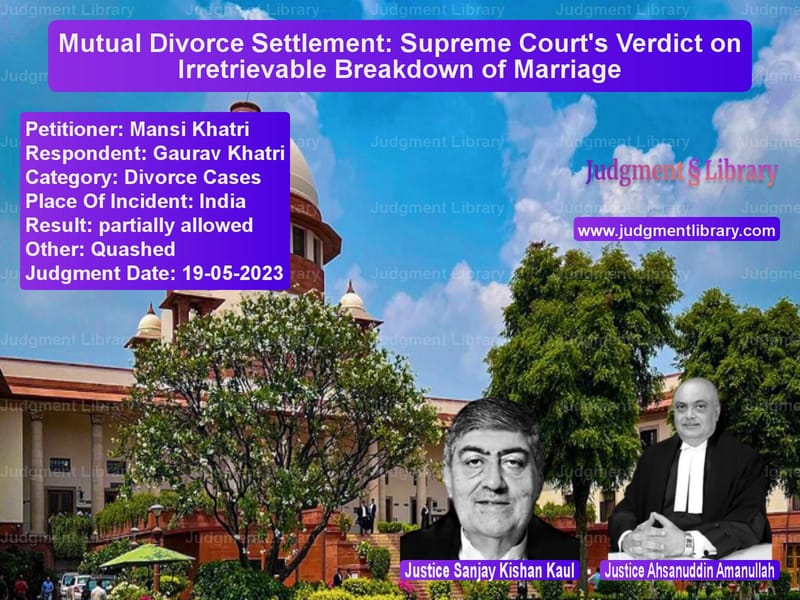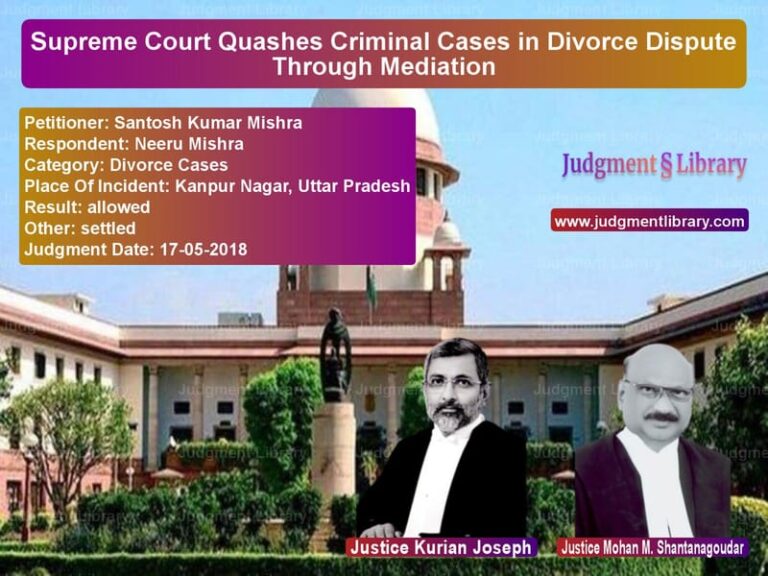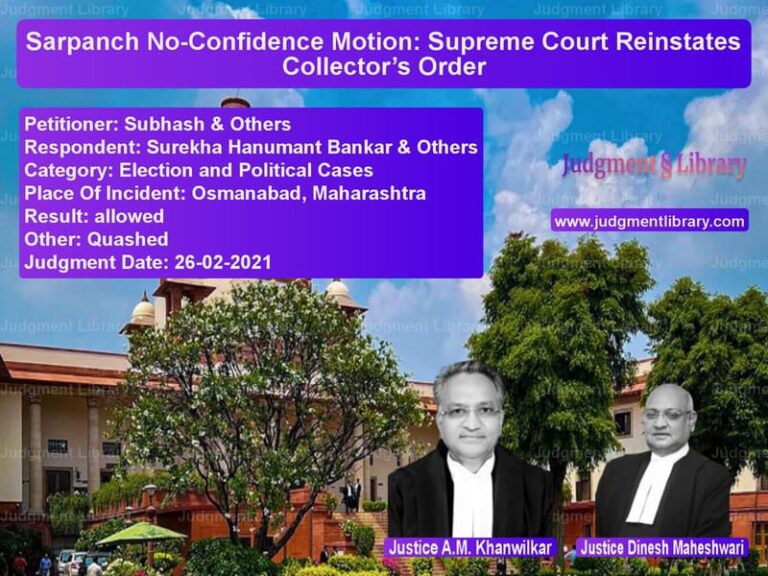Mutual Divorce Settlement: Supreme Court’s Verdict on Irretrievable Breakdown of Marriage
The case of Mansi Khatri vs. Gaurav Khatri highlights the complexities involved in matrimonial disputes, particularly in cases where both criminal and civil proceedings are initiated. This case, heard before the Supreme Court of India, revolved around the transfer of a divorce petition and subsequent legal matters, ultimately leading to a decree of divorce by mutual consent. The judgment provides significant insight into the application of Article 142 of the Constitution to render complete justice by resolving all pending cases between the parties.
Background of the Case
The petitioner, Mansi Khatri, filed a transfer petition seeking the transfer of Divorce Petition No. 802 of 2022, which had been filed by the respondent, Gaurav Khatri, under Section 13(1) of the Hindu Marriage Act, 1955. The divorce case was pending before the Principal Judge, Family Court, Indore, Madhya Pradesh, and the petitioner sought its transfer to the Family Court in Lucknow, Uttar Pradesh.
The marriage between the parties took place on 12th December 2016, but they separated on 29th October 2021. During this period, multiple legal proceedings were initiated, including:
- FIR No. 0234 of 2022: Filed by the petitioner’s father at Police Station Ghazipur, Uttar Pradesh, under Sections 498A (cruelty), 323 (voluntarily causing hurt), and 354 (outraging modesty) of the Indian Penal Code, along with Sections 3 and 4 of the Dowry Prohibition Act, 1961.
- Maintenance Case No. 749 of 2022: Filed by the petitioner under Section 125 of the Code of Criminal Procedure, 1973, pending before the Family Court, Lucknow.
Attempts at Mediation
Recognizing the possibility of reconciliation, the Supreme Court, in its order dated 7th December 2022, referred the matter to the Supreme Court Mediation Centre. However, the mediation failed. During subsequent hearings, the respondent expressed willingness for a divorce by mutual consent, but disputes remained regarding the quantum of permanent alimony.
Arguments Presented Before the Court
Petitioner’s Arguments
The petitioner contended that:
- Since she had already filed legal proceedings in Lucknow, traveling to Indore for divorce proceedings would cause undue hardship.
- She had no independent income and was financially dependent on her father.
- The respondent was well-settled with a stable income and should be directed to pay adequate permanent alimony.
- She sought an amount of Rs. 70,00,000/- (Seventy Lakhs) as permanent alimony.
Respondent’s Arguments
The respondent submitted that:
- He was willing for divorce by mutual consent but was only offering Rs. 25,00,000/- (Twenty-Five Lakhs) as permanent alimony.
- His financial obligations included supporting his elderly parents and repaying a car loan.
- He had stable employment but had multiple financial liabilities.
Supreme Court’s Observations
The Court, after hearing both parties, noted that the marriage had irretrievably broken down and reconciliation was not possible. The judgment emphasized:
- “The parties, in praesenti, husband and wife, have suffered an irretrievable breakdown of marriage. In such view, in order to render complete justice, it is a fit case to exercise the power vested under Article 142 of the Constitution of India by closing all cases filed by the parties against each other and also granting a decree of mutual consent divorce.”
Additionally, the Court summarized the financial status of both parties before determining the alimony:
Petitioner’s Financial Status
- Bank Balance: Rs. 20,712/-
- Monthly Expenses: Rs. 25,000/-
- Assets: Only a Mangal Sutra and an engagement ring
- Income: Nil (financially dependent on her father)
Respondent’s Financial Status
- Annual Salary: Rs. 15,90,788/-
- Take-Home Salary: Rs. 87,538/- per month
- LIC Policy Premium: Rs. 2,61,364/-
- EPF Account: Rs. 4,47,240/-
- PPF Account: Rs. 3,28,923/-
- Bank Balances: Rs. 62,629/- (SBI), Rs. 30,744/- (ICICI), Rs. 10,417/- (Bank of Baroda)
- Car Loan: Rs. 5,75,000/- (EMI: Rs. 8,850/- per month)
- Dependent Parents
Final Judgment
The Supreme Court ordered:
- The divorce petition shall stand withdrawn.
- The parties are granted a decree of divorce by mutual consent.
- The amount of permanent alimony to be paid by the respondent to the petitioner is fixed at Rs. 35,00,000/- (Thirty-Five Lakhs), payable within six months.
- All pending cases between the parties, including FIR No. 0234 of 2022 and Maintenance Case No. 749 of 2022, are quashed.
- If the permanent alimony is not paid within the stipulated time, the FIR and maintenance case shall stand revived.
Legal Significance of the Judgment
This judgment reinforces key legal principles:
- Use of Article 142: The Supreme Court exercised its extraordinary powers to ensure complete justice by closing all legal proceedings between the parties.
- Recognition of Irretrievable Breakdown: The Court acknowledged that the marriage had broken down beyond repair and granted divorce by mutual consent.
- Equitable Alimony Determination: The Court carefully assessed the financial status of both parties before fixing the alimony amount.
- Balancing Interests: The ruling balanced the rights of the petitioner to financial support with the respondent’s ability to pay.
Conclusion
The Supreme Court’s decision in Mansi Khatri vs. Gaurav Khatri sets a precedent for similar matrimonial disputes where multiple legal proceedings are pending. By invoking Article 142, the Court ensured that both parties could move forward with their lives without prolonged litigation. This judgment serves as a valuable reference for cases involving divorce, alimony, and the resolution of criminal and civil proceedings through judicial intervention.
Petitioner Name: Mansi Khatri.Respondent Name: Gaurav Khatri.Judgment By: Justice Sanjay Kishan Kaul, Justice Ahsanuddin Amanullah.Place Of Incident: India.Judgment Date: 19-05-2023.
Don’t miss out on the full details! Download the complete judgment in PDF format below and gain valuable insights instantly!
Download Judgment: mansi-khatri-vs-gaurav-khatri-supreme-court-of-india-judgment-dated-19-05-2023.pdf
Directly Download Judgment: Directly download this Judgment
See all petitions in Alimony and Maintenance
See all petitions in Mutual Consent Divorce
See all petitions in Dowry Cases
See all petitions in Divorce by Desertion
See all petitions in Judgment by Sanjay Kishan Kaul
See all petitions in Judgment by Ahsanuddin Amanullah
See all petitions in partially allowed
See all petitions in Quashed
See all petitions in supreme court of India judgments May 2023
See all petitions in 2023 judgments
See all posts in Divorce Cases Category
See all allowed petitions in Divorce Cases Category
See all Dismissed petitions in Divorce Cases Category
See all partially allowed petitions in Divorce Cases Category







